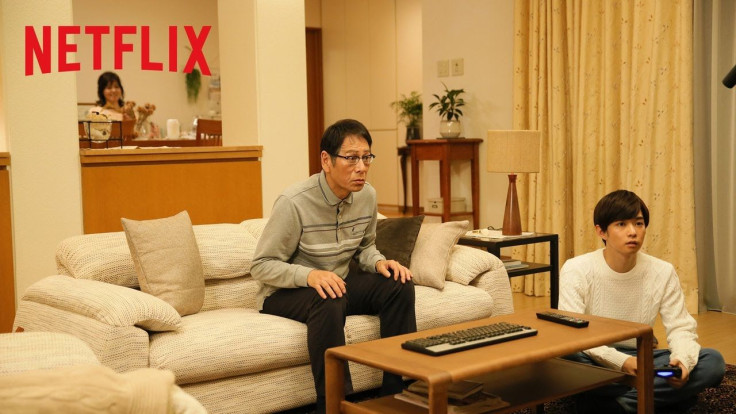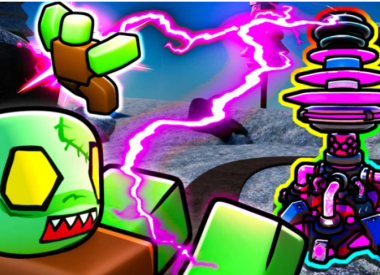Final Fantasy XIV: Daddy of Light caused something of a stir when originally announced, solely because of what some saw as a rather saucy title. But once the J-Drama finally arrived on Netflix, it was titled Final Fantasy XIV: Dad of Light. Unfortunately, losing “Daddy” meant losing the most interesting thing about this mawkishly sentimental, by-the-book J-Drama, which is loosely based on actual events.
The story centers around son and father Akio and Hakutaro. Each episode begins with a sun-drenched flashback to the foibles of Akio’s youth: disappointing his father by giving up at Kendo, sharing time with him on the original Final Fantasy, wishing his dad would just throw the ol’ ball around with him and other such vignettes.
Akio, played by Yudai Chiba, looks all of 15-years-old and has the most infuriatingly precise side-parted hair I’ve ever seen. His acting has all the subtlety of a harpoon lancing a whale. I assume it’s an issue of direction, not talent: it’s supposed to be funny when Akio’s face twitches with irritation or his eyes widen with barely-repressed shock, but gags that work in animation just seem clownishly over-the-top in real life.
Aside from these “comedic” moments, Akio has all the expressive range of a doll, which is perhaps by design since he’s but a humble young salaryman at a sales company. In fact, he’s so emotionally reserved that the only way he can think of to communicate with his equally reserved father is via Final Fantasy XIV. After his father abruptly quits his job in upper management, Akio buys his dad a PlayStation 4 and a copy of Final Fantasy XIV and secretly befriends him in-game to find out why.
The show’s only true moments of charm come from Akio’s dad Hakutaro, played with tremendous dignity and tenderness by Ren Oosugi. Even in moments of comedic exaggeration, Hakutaro seems like a real person. His first fumbling steps in Final Fantasy XIV are played for their greatest possible comedic potential: he tries to type with a broken keyboard and only says “aaa,” he gets into an area way over his level and is embarrassed that his clothes don’t match the environment, and he turns out to be a determined goofball who doggedly throws himself at boss battle after boss battle until he vanquishes it.
If Final Fantasy XIV: Dad Of Light were all about Hakutaro’s funny, charming, sincerely touching adventures in Eorzea, it might be a more interesting show. Instead, we are forced to deal with Akio: Akio’s inane musings on his childhood, Akio’s insanely boring job, Akio’s abortive attempts to crack open his piehole and speak a single word to his progenitor. At least Akio’s female Miqo’te avatar has a lively, energetic voice.
We never really get to know Akio’s guild members or see their faces, except for at the very end of the show during the latter half of the “special” episode which is half recap, half extremely heterosexual marriage plot. The story keeps its focus tight on Akio and Hakutaro, leaving very little for the talented actress who plays Akio’s mom, Mako Ishino, to do except smile, nod or nag. If Akio were as strong or appealing a character as his father, this might not be a bad thing, but Akio scenes are torture to sit through. Whether he’s struggling with some work-related difficulty neatly solved by a lesson learned from Final Fantasy XIV or grappling with his father’s secrets, there’s just no connection between him and the viewer.
As for Akio’s work, there are a few funny moments there, but they’re contrived and far between. More entertaining by far, though not on purpose, is the idea that female unhappiness in the workplace can be solved by a cute uniform… “cute,” of course, meaning a checkered powder-pink monstrosity that would be considered over the top for four-year-olds to wear on their first day of pre-k. Equally as entertaining is the idea of the cutest girl in the company being somehow attracted to Akio, a total dork whose side part has more spine than he does.
But his relationship with the cute girl at work is never resolved. The female coworkers are shrill, hysterical background noise. His mom is a motherly non-entity, vaguely emanating aproned maternal energy from the kitchen where she’s permanently ensconced. Akio’s hot, cool senior coworker, permanently puffing on a cancer stick, doesn’t really do anything except make you wish you were following him around instead.
Finally, the Machinima-style scenes made in the actual Final Fantasy XIV game engine just don’t look as good as they should. Characters keep walking when they should stop, emotes take an awkward half-second too long to register and the level of expressiveness just isn’t there. For a show that harps so much on the beauty and grandeur of Final Fantasy XIV , I’m surprised the production didn’t invest in a top-tier computer with high-end graphics to best convey some of the game’s sweeping landscapes. Instead, they focused on the doofy character models, which are great for playing Final Fantasy XIV but not so much for conveying even the insipid drama of Dad of Light.
At the end of the day, Final Fantasy XIV: Dad of Light is a predictable, corny bore whose only real appeal lies in the Final Fantasy skin laid over the manipulative, predictable plot. To call it “tearjerking” is to insult both tears and jerks. Ren Oosugi is by far the show’s grace note, and Hakutaro’s dadly adventures in Eorzea provide the only real humor or heart. Akio is as two-dimensional as his coworkers; his Miqo’te avatar’s shaders have more depth. Aside from Hakutaro, the only thing I liked about the show was its use of Final Fantasy XIV’s beautiful soundtrack.
Unless you are a huge fan of Final Fantasy XIV or have run out of hokey J-Dramas to watch, you can freely skip Final Fantasy XIV: Dad of Light.


















